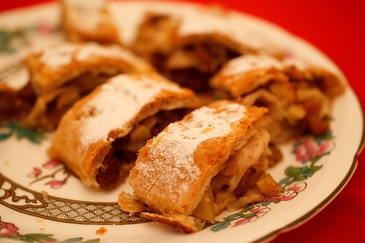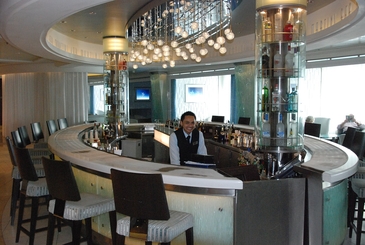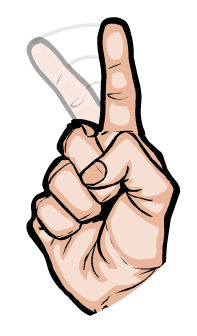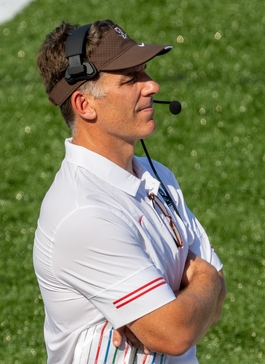The Checker Maven
The World's Most Widely Read Checkers and Draughts Publication
Bob Newell, Editor-in-Chief
Published every Saturday morning in Honolulu, Hawai`i
Noticing missing images? An explanation is here.
The Beacon Cafe: A Winter Visitor
Bismarck, North Dakota, is a cold weather city to say the least, and January is the coldest of all the months of the year. So the members of the Coffee and Cake Checker Club, which met on Saturday afternoons from just after Labor Day until just before Memorial Day, were very surprised when a visitor walked into their venue, the Beacon Cafe, on a very cold Saturday in January 1955. (Regular readers know that it's always 1955 at the Beacon Cafe.)
It was a few minutes after 1 PM and the "boys" who made up the club (all but one of whom were at least 50 years old) had gathered as usual in the big booths in the back of the Cafe. On seeing the new entrant, Sal Westerman, the Club's unofficial leader, stood up.
"Newboy!" he exclaimed. "Is it really you?"
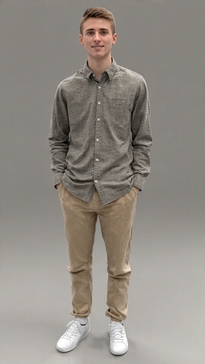
Bob "Newboy" Bertollin
The young visitor smiled, "Indeed it is, Sal!"
"Newboy" was actually a skilled checkerist named Bob Bertollin, whom Sal had played against during a major summer checker tournament in Las Vegas. Sal and Bob had tied for third and fourth in that high level event.
"I had no idea you were coming to Bismarck," Sal said. "What brings you here?"
"Just passing through on my way to Minneapolis," he said, "and as I knew about your club, I thought I'd stay overnight before continuing on tomorrow morning."
Sal smiled. "You're more than welcome to be here," he said. "Let me introduce you around."
Today Delmer, Wayne, Larry, Dan, Mike, Ron, Young Blaine, and Louie the Flash were on hand and they all shook hands and greeted "Newboy." Then Sal continued, "Tell you what, Newboy. You're a young and upcoming checkerist, and so is Young Blaine here. How about the two of you play a game while the rest of us kibitz?"

Young Blaine
Young Blaine, upon hearing this, had kind of a wary look. "I don't know, Sal, you've said what a good player Newboy is; I don't think I'd have a chance."
Sal chuckled. "Tell you what, Young Blaine, how about this. I'll back you up. If you can win or even draw against Newboy here, I'll buy all the treats today."
Newboy quickly spoke up. "No Sal, I'll buy no matter what as long as Young Blaine here plays a game with me. Seems only right to thank you for your hospitality."
"Very nice of you, Newboy," Sal said, "so how about it?"
The rest of the boys urged Young Blaine on and he soon agreed. "Why not?" he finally said, and everyone cheered.
Deana, the proprietess of the Cafe and an award winning baker, not to mention a great marketer, casually mentioned that today she had freshly made chocolate macadamia bars. "A friend of mine brought me back some mac nuts from Hawai`i," she noted, "and the treats are extra-special today."
Deana then poured more coffee for everyone although Newboy actually requested hot tea. Then the game began with all of the boys watching closely.
Black: Young Blaine
White: Bob "Newboy" Bertollin
| 1. | 12-16 | 24-20 |
| 2. | 8-12 | 28-24 |
| 3. | 3-8 | 23-18 |
| 4. | 16-19 | 24x15 |
| 5. | 10x19 | 21-17 |
| 6. | 11-15 | ... |
Sal and a couple of the boys frowned just a bit but tried not to let Young Blaine see their reaction to this move.
| 6. | ... | 18x11 |
| 7. | 8x15 | ... |
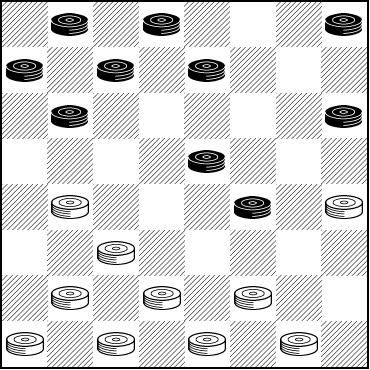
WHITE
White to Play and Win
W:W17,20,22,25,26,27,29,30,31,32:B1,2,4,5,6,7,9,12,15,19
Newboy knew he now had a win.
What should Young Blaine have played instead of 11-15? And how is Newboy going to win it? A word of warning; the solution is long and requires precise play.
Although as always you'll need to supply your own treats, give this a try and then click on Read More to see the solution and the brief conclusion of our little story.![]()
The Little Checker Girl
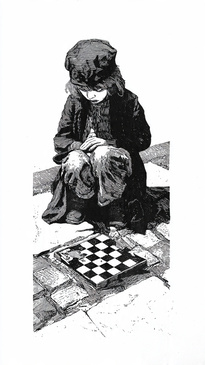
No one knew much about her, not where she lived, if anywhere; not who her parents were, if she even had any; not even what her real name might be, if she herself even knew what it was. They all just called her "The Little Checker Girl" because she would be seen on various streets around the downtown area of this big northern city, sitting with her back up against a building, her checkerboard on the sidewalk in front of her, asking and sometimes even begging passers-by to play a game with her.
"Play checkers for a dollar?" she would call out. "Easy to play, easy to win!" Once in a while someone would take pity, or take interest, or just take a moment, and a dollar bill would go into the grimy pocket of the girl's tattered overcoat.
They would see her even on cold days and often well after darkness, inviting play under a street lamp. "Only a dollar! Play a game before you go home!" But in the chill darkness of the night, there was no crowd and the few stragglers just wanted to go to their trains or cars or buses, to get home and out of the cold, to have a hot meal, and to climb into a warm bed. But there was none of that for the Little Checker Girl.
If someone asked her name she would perhaps say Suzie, or maybe Carol or Betty or something else. A few people, the ones who passed by more often, would ask, "What's your name today, Little Checker Girl?"
Little Checker Girl was thin and wan. She looked a bit better in the summer but the winters took their toll. She had been playing on the streets for about three years, and those who cared to think about it believed her to be around ten years old. But not likely, they said, to be around much longer.
This winter had unfortunately been especially severe, and there were many days and nights of cold and snowy weather. It was late in December and tonight was in fact Christmas Eve. Most offices had let out early and by dark the streets were nearly empty. But the Little Checker Girl was still huddled up against a building, hoping to play a game for a dollar; maybe someone would even give her an extra dollar because it was almost Christmas.
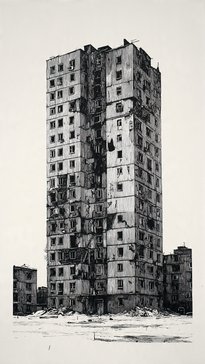
She needed the money badly; what no one knew was that she lived in a room in a crumbling apartment building that had long been abandoned. She had found a spot on a high enough floor where the drunks and the vagrants didn't go because it was too much of a climb on steep stairs. She got water from a faucet in a nearby courtyard. She had scavenged an old bucket and a little tiny oil stove on which she warmed whatever food she could obtain, and then use it--- sparingly, as oil was costly--- to make a little heat on the coldest nights.
Unfortunately on this night, on Christmas Eve, she had neither money nor food and the oil canister was empty. Filling it up cost five dollars and food cost a couple of dollars more. So she stayed out in the bleak night in the hopes of getting just enough money to buy a little fuel and something to eat.
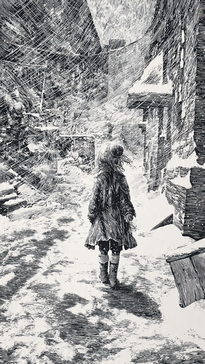
But then it started to snow and the street was now completely empty. In sadness the Little Checker Girl packed up her board and pieces and started on her way to her bleak and cheerless home. It would be a cold and hungry night, but at least she could get out of the snow and the biting wind that was now blowing stinging snowflakes into her face.
However, the snow soon became so heavy that she couldn't see a foot in front of her. She must have lost her way, for much time had passed and still she hadn't reached the old building in which she took refuge.
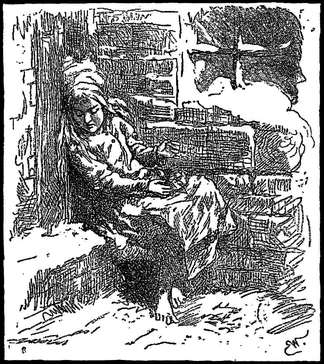
Public Domain
Finally she gave up and went into an alleyway to get a respite from the wind. She huddled up in a corner, pressing her back into the walls of a grimy brick building, hoping that perhaps a little heat would leak through from inside. It was so very cold.
The Little Checker Girl wrapped her arms around herself and before long her eyes closed. Her mind as well as her body was numb and she wanted to sleep, not realizing that she might never again awaken.
"Little Checker Girl, wake up! I want to play a game of checkers with you!"
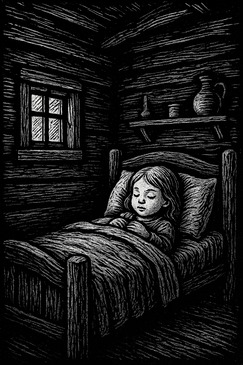
Slowly Little Checker Girl's eyes opened. Vaguely she remembered falling asleep--- or was it something else?--- in an alley in the midst of a snowstorm. But now she saw neither snow nor grimy walls nor dingy buildings. She was in a soft bed, covered with warm quilts, in a small rustic cabin where a fire was blazing brightly on the hearth.
The voice she heard belonged to an elderly, grey-haired woman with kind eyes and a soft expression. "Come over to the table," she said, "and in a moment we can play a game or two of checkers."
Little Checker Girl folded back the bedclothes and saw that she was clothed in a fine wool nightdress, with woolen stockings on her feet and a woolen cap on her head. There was no sign of her tattered overcoat or her other well-worn clothing. In the center of the cabin there was a rough wooden table, and on it was a fragrant loaf of bread, plates of butter and jam, and a steaming pot of tea ... and her checkerboard and pieces.
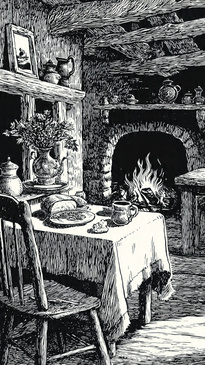
Little Checker Girl realized how hungry she was and, murmuring thanks, went to the table and spread slices of bread thick with jam and butter. She ate gratefully and drank some of the delicious hot tea. And while she had her meal, the best meal she could remember in ages and ages, the kindly old woman spoke.
"You know, your name isn't really Little Checker Girl," she said, "or any of the other names you've been using. It's actually Maureen and I know all about you. I know how your parents and brothers and sisters all died in a fire one night, and how you escaped with only your checkerboard and the clothes on your back. You were afraid and ran away and no one ever found you, for they all thought you died in the fire too."
Maureen looked up, surprised. "But I don't remember ... " she started to say, but the kindly woman interrupted.
"No you don't," she said, "it was so horrible your mind blocked out your memories. And even though I tell you of it now, it will all still stay locked away. That's for the best, I think, and in any event you are safe now in a warm place with food to eat and someone to care for you. If you wish, you may stay here with me for as long as you like. There are other children in the neighborhood with whom you can play, there are schools where you can go to learn, and you need not worry about anything ever again."
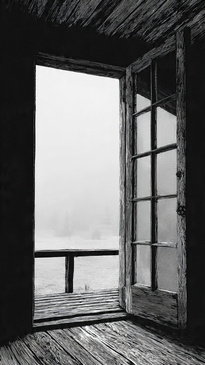
Maureen stood and walked around the cabin. Outside she could see a mist imbued with warm, ethereal light. "Oh! It is such a generous offer! I will of course stay here and live with you," she said. 'But what shall I call you?"
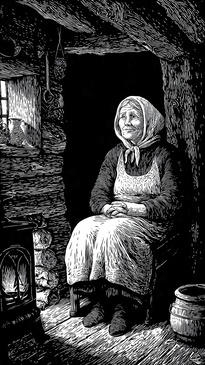
"My name is Seraphina, and I am your Guardian Angel."
Maureen smiled and went to Seraphina and gave her an affectionate hug. "Thank you again," Maureen said, "and we can play that game of checkers now if you wish."
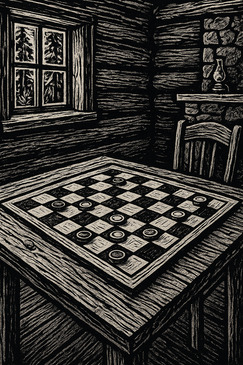
Our story is of course inspired by the Hans Christian Andersen classic The Little Match Girl. We hope you found it appropriate to the season.
Maureen and Seraphina played checkers often and their games were always friendly, spirited, and a great source of enjoyment for them both. Here's one game that led to an interesting position.
| 1. | 11-15 | 23-19 |
| 2. | 7-11 | 22-17 |
| 3. | 11-16 | 26-23 |
| 4. | 16-20 | 30-26 |
| 5. | 2-7 | 25-22 |
| 6. | 8-11 | 19-16 |
22-18 was best here. Black now will get a solid advantage.
| 7. | 12-19 | 23-16 |
| 8. | 4-8 | 16-12 |
| 9. | 11-16 | 17-13 |
Seraphina
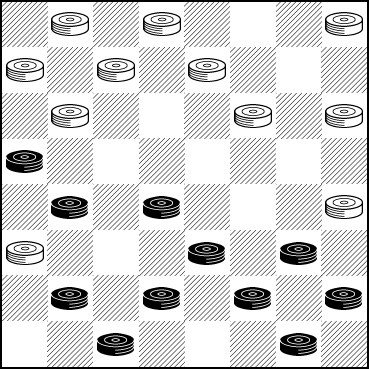
BLACK
Maureen
Black to Play and Win
B:W12,13,21,22,24,26,27,28,29,31,32:B1,3,5,6,7,8,9,10,15,16,20
How would you win this one? What move do you think Maureen played? Can you match wits with her? See what you can do and then click on Read More to see the solution.![]()
Christmas Dinner with Marvin and Priscilla

Marvin J. Mavin
"Please don't tell me you're thinking of another cruise," Marvin said.
"Oh, no, dear," Priscilla replied, "not in the least. After all, how could we top that cruise to Panama we took over Thanksgiving? That was marvelous, wasn't it?"

Priscilla Snelson
Priscilla, as our regular readers know, is Priscilla Snelson, the wife of Marvin J. Mavin, and the CEO of the giant international conglomerate Rust Belt Holdings. Marvin is the superstar Captain of the Detroit Doublejumpers, a team in the National Checker League, and one which has been a many time winner of the World Series of Checkers.
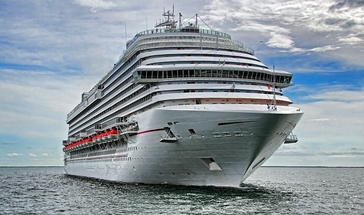
In our previous story, Marvin and Priscilla cruised on Luxury Lines from Miami to Panama, a voyage in which Marvin was coerced into giving checker lessons and directing a checker tournament. The cruise experience was much more to Priscilla's liking than to Marvin's.
"No, dear husband, we have a special invitation for Christmas dinner, and it's interesting that you should mention our cruise, as the invitation stemmed directly from someone we both met on-board."
Marvin was instantly wary. "Whaddya mean, Prissy?"
"Don't call me Prissy! How many times must I tell you that! But ... anyhow ... you remember that nice gentleman who sat next to you at Thanksgiving dinner at the Captain's table?"
Marvin in fact did remember all too well.
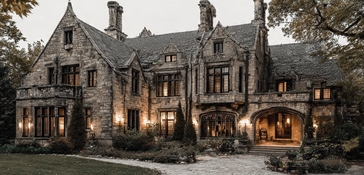
"Well," Priscilla continued, "wouldn't you know it, but he has a home nearby! Normally, of course, he works on Wall Street in New York, but he has a getaway mansion in Grosse Pointe and goes there for the holidays. Isn't that grand! You surely remember Nicolas N. Nickelson, the hedge fund manager?"
"Um ... uh ... like, are you sayin' that this stuck-up rich dude invited us and stuff?"
"Yes, he did! He and I got to be friends over drinks while you were doing your checker duties, and we'll be going to his vacation mansion for Christmas dinner!"
"I think even a cruise would be better than that," Marvin muttered under his breath. Then, aloud, he said, "Please tell me he didn't invite us for New Year's Eve, too?"
"Oh no, dear, that would have been nice, but he has to be back in New York to entertain clients from Qatar and Monte Carlo. In any case, we'll be joining my business friends for New Year's Eve at a private party one of them is putting on in Aspen."
Marvin was speechless, and perhaps that was just as well.

It was Christmas Day. Priscilla and Marvin had slept in and, just after breakfasting on a Christmas special of caviar served on poached eggs, they had exchanged gifts. Priscilla gave Marvin a diamond encrusted Swiss watch, even though she knew Marvin rarely wore a watch. "It's the thought that counts," she told him. In turn, Marvin gave Priscilla the keys to a brand new Mercedes, as her current Mercedes was already a good 18 months old, and by Priscilla's standards was due for replacement.
A cozy afternoon passed but at around 4 o'clock Priscilla reminded Marvin that it was time to change into dinner clothes. "Cocktails at 6, dinner at 8," she announced, "and I doubt that Mr. Nickelson would care to be kept waiting."
"Dinner clothes?" Marvin said. "I ain't got no ... "
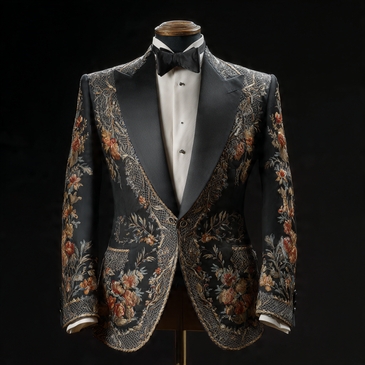
"No, no," Priscilla interrupted. "Not a tux, just a dinner jacket, a white shirt, and a black bow tie. You've got several dinner jackets from other occasions. Just look in the back of your closet; I had one freshly dry-cleaned and pressed for you. Wasn't that considerate of me?"
Priscilla's limo proceeded at a stately pace down the quarter-mile long driveway of Nicholas Nickelson's vacation mansion, smartly turned into the loop at the top of the drive, and came to a gentle halt. Immediately liveried footmen opened the doors of the limo and showed Priscilla and Marvin to the enormous entryway.

Nicolas Nickelson
Mr. Nickelson himself greeted the arriving couple just inside the door. "Dear sweet Priscilla," he exclaimed with a smile, kissing her once on each cheek. Then he turned to Marvin and, with seeming reluctance, offered a hand. "And you must be, of course, yes, that checker playing husband." His handshake was perfunctory at best. "I remember you from the cruise. You were a hired hand, weren't you, what with ... what did you do ... give lessons or something? Some sort of minimum wage job? Or did you just work for food?" Nickelson laughed. "Imagine that!" he said. "I can see the sign! 'Will teach checkers for food!' How marvelous a sight that would be!"
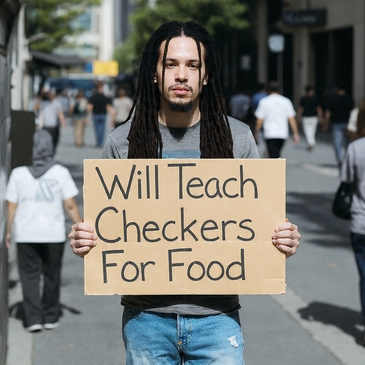
Marvin glanced over at Priscilla, who merely warned Marvin with a look not to say anything in return. But Nickelson wasn't quite done. "Maybe I can introduce you to some of my hedge fund friends! Perhaps they'd give you a hot dog in return for a lesson! But I'm in the business of making money for myself and my clients. Scads of money. So we have to play chess, not checkers."
"That old line again?" Marvin said, unable to hold back. "I heard that at from all those CEOs this past summer and I had to straighten them out!" (Please see our previous Checker Maven story.)
"Oh," Nickelson said, "did you teach some CEOs? Did they feed you well? Hamburgers, even? Or are you happy with instant ramen!" He laughed again.
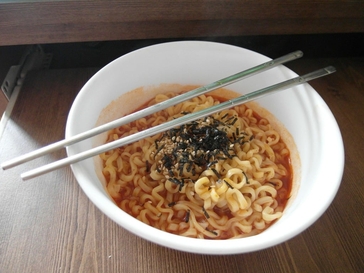
Public Domain
"Dude, do you play checkers?" Marvin said it almost in a growl. Priscilla grabbed his upper arm and squeezed hard in further warning. But it was too late.
""Course I do," said Nickelson with a laugh. "Who doesn't? It's a kid's game, right, we all learned it as kids, except apparently----" Nickelson paused to look Marvin in the eyes--- "some of the kids never grew up! Ha ha ha!" He paused a moment. "But anyhow, did I invite you to this party? Why are you here?"
Priscilla finally spoke up. "Marvin is my husband, don't you remember? You invited us as I recall."
Nickelson reflected a moment. "Yes, 'spose so," he said, "but I didn't think you'd actually bring him. I thought we were going to, you know, have a nice little night of private time upstairs, just you and I. What do you think, Marvin, wouldn't that be nice ... for Priscilla and I to have a little alone time, upstairs?"

Marvin made a fist, pulled back his arm, and was about to connect with Nickelson's nose when Priscilla yanked him back. "No violence, honey," she said. "I think I mis-estimated Mr. Nickelson quite badly. You were quite insulting, sir, and I tried to get Marvin to remain polite with you, but you've pushed things too far and your suggestive talk insulted me as well. So here's what I propose. Instead of Marvin slugging you in the nose and knocking you on your fat tail, but probably getting arrested for doing so, how about the two of you play a nice little game of checkers? You say you're this superior chess person, so surely you'd win a simple game against someone whom you say isn't even a real grownup?"
Nickelson glared. "Sure," he said, "I'll take on your child husband, but let's make it worthwhile. What do you say we stake $100,000 on the game?"
"Oh, no," Priscilla said, "let's make it even more interesting. $500,000. And you get draw odds. You win the bet if Marvin loses or draws."
"Honey, gee," Marvin said, "draw odds? That's takin' a risk ... "
"You'll win," Priscilla said, "or I'll be the one breaking your nose."
"Let's do it," Nickelson said, and then announced the terms of the match to the partygoers. One of the event staff set up a checkerboard and the crowd gathered around to watch.
The game began. Nickelson played a reasonably decent game and the position came down to the one shown below with Marvin to move.
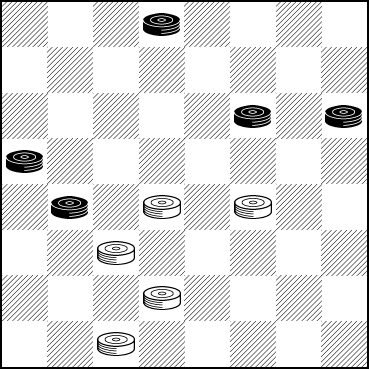
WHITE
White to Play, What Result?
W:W18,19,22,26,30:B2,11,12,13,17
"A cool half million," Nickelson said, "for you can't possibly win this one. Half a million, why, that's a week's worth of my earnings! It will be nice to have!"
A lot is on the line; half a million dollars, and definitely ego and prestige. Marvin surely must be feeling the pressure. There's no pressure on you, though; solve the problem at leisure without (we hope) any risk of losing a lot of money and status, not to mention getting punched in the nose. When you're ready, click on Read More to see the solution and the conclusion of our story.![]()
Holidays Ahead: The Beacon Cafe
"We know you had a great time over Thanksgiving at your sister in law's place in Dickinson," Delmer said. "So tell us, are you going in for a repeat performance this Christmas? Maybe you can stay until New Year's Day!"
Everyone laughed, except the target of the remark, the elderly gentleman Sal Westerman.
The location was the Beacon Cafe in Bismarck, North Dakota. It was December 1955 and the holidays were just a week away. The occasion was the weekly meeting of the Coffee and Cake Checker Club, which met every Saturday afternoon from just after Labor Day to just before Memorial Day, with time out for the Thanksgiving and Christmas / New Year's holidays.
Sal was the club's informal leader, and the ones teasing him were the "boys" of whom all but one were at least 50 years old.
In our previous Beacon Cafe story, we recounted how Sal's wife, Sylvia, got him to go out to Dickinson for Thanksgiving at her sister in law Phoebe's home. Phoebe and Sal, as also recounted in previous stories, didn't exactly have a cordial relationship, what with Phoebe's constant criticism of Sal's checker hobby, among many other perceived shortcomings.
"No," Sal finally replied, slowly and deliberately, "we won't be going to Dickinson. Our daughter Joyce is able to get some time off from the law practice and will come over from Washington for a visit. We'll be staying home and spending our time with her."
Everyone commented as to how nice that would be. The boys individually commented on their own plans. Most of them would be home with family or going out to the family farm for several days. Louie the Flash, predictably, had a girlfriend lined up and would have Christmas at her place. He wasn't so sure about New Year's Eve, though, as he said "the relationship really isn't going all that well." That got another laugh from everyone, as Louie went through girlfriends as fast as a Cadillac went through gas.
Deana, the proprietess of the Cafe, would of course visit with family in Gackle and close the Cafe for about ten days. But when it came to Young Blaine, who had over the summer gotten married to his now-wife Moira, the teasing shifted away from Sal and onto Young Blaine.

Moira
"So then, Young Blaine," Wayne began, "are you taking Moira on a spectacular holiday vacation?"
Young Blaine turned a bit red. "Actually," he said, "that's something of a problem."
"What do you mean?" Dan asked. "You just buy a ticket to Paris or Rome and off you go! Problem solved."

Young Blaine
"Uh, remember, I'm just an Assistant Engineer," Young Blaine replied, "and I can't afford that kind of thing."
"With you and Moira both working?" Dan added.
"Besides," Young Blaine continued, "neither of us have that much vacation time, especially after our honeymoon. But ... well ... that's kind of what Moira and I have been ... disagreeing about."
"Fighting, you mean?" Wayne said.
"Not exactly fighting ... well, okay, a little. Moira didn't think our honeymoon was long enough and she wants what she calls a 'continuation" and she wants it in Hawai`i."
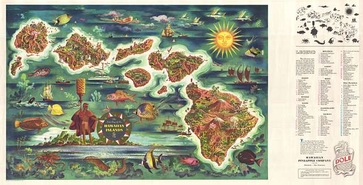
Public Domain
"Oh, boy," Larry said, "get out your checkbook for that one."
"I know," Young Blaine went on, "and she says we have enough vacation to go for one week. But that hardly seems worth it, to spend so much money for just a week. I want her to wait for summer when we can go for two weeks, as we'll have more money and vacation time saved up. But she won't hear of it. 'Now or never' she says, and the 'never' part sounds kind of ... I don't know ... threatening?"
At this moment Sal chuckled. "Young Blaine," he said, "Moira is a new bride, and she wants to keep that special 'just married' feeling. You can't blame her for that. Certainly she's not threatenng you; she just wants to get your attention. Now, take it from me. You're only young once, and not even for all that long, and hopefully you're only newly married once. So go along with things. Make her extra happy. Take out a small loan if you must. Show her that she's at least as special after marriage as she was before. You'll never regret it."
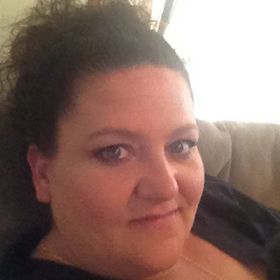
Deana
There were nods around the table, and even Deana (who had never herself been married) chimed in.
"Uh ... okay ... " Blaine stammered, "but ... uh ... Sal ... shouldn't we be doing a checker problem or something?"
Sal chuckled once more. "Yes, Young Blaine, we should, and you've had enough teasing and free advice for one afternoon. Here you go, boys."
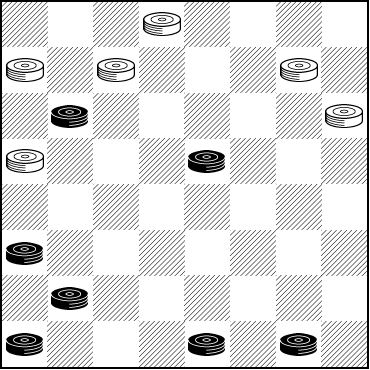
BLACK
Black to Play and Win
B:W20,21,25,27,28,31:B1,2,4,8,12,18,24
Sal laid out the following position on a couple of the checkerboards in the big booth in the back of the Cafe where the boys always sat. And of course Deana announced today's treat: apple strudel. The way it always worked was that the boy would attempt Sal's problem and if they solved it Sal bought the treats; if they couldn't, they bought treats for Sal and Sylvia.
Sal gave the boys an hour and soon they were in deep concentration.
A second honeymoon in Hawai`i over the holidays; that's quite a lot for Young Blaine to think about. While we don't know what you, our reader, will be doing over the holidays, we suspect it may not be a second honeymoon--- but who knows? Anything can and does happen in the world of checkers. Meanwhile, though, see how you do on today's problem, and then click on Read More for the solution and the brief, and possibly surprising, conclusion to our story.![]()
Josh's Dilemma --- Conclusion
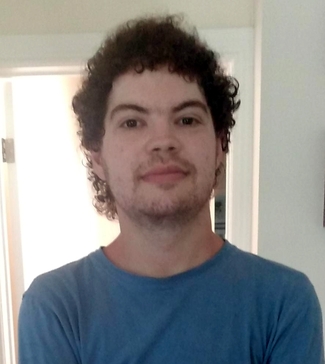
"Gosh Josh" Gordon
Josh continued to postpone talking to Coach. He'd feel one way about it and then he'd feel another way, and now he was concerned about what Amy had said. He had a sneaking suspicion about what might be wrong ... but he couldn't be sure without talking to her again, and that would require contacting her at home, prior to the third and final match, which might well be out of line. In any case he didn't have her number.
Josh spent something of a sleepless night, upset by both his own dilemma and Amy's troubles, whatever they might be. But then, early in the morning, when Josh was about to give up on trying to sleep, the hotel room phone rang.
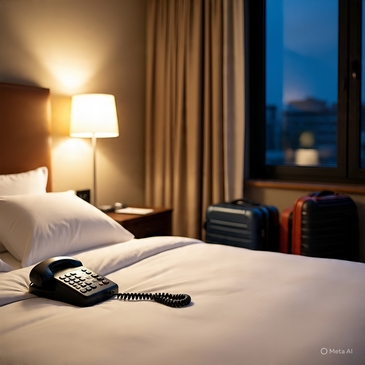
"Is it Mr. Gosh?" the voice on the phone said.
Josh groaned. "This is Josh. You again? The guy with the phony team in the phony kingdom?"
"Ah, so you are not yet a believer. Never mind; your playing is very well," the voice said. "Do another good play tonight and the big offer we will make." At that, the line disconnected.
This had gotten way too far out of line and Josh had had enough. He picked up the room phone again and called Coach's room.
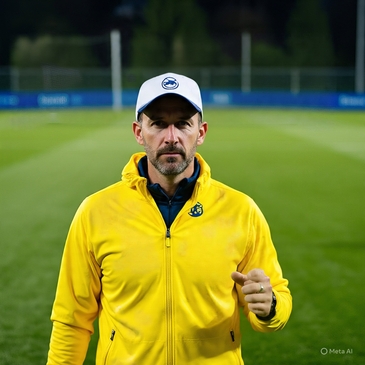
Erie Eliminator Coach
"Hello?" Coach answered.
"This is Josh, Coach. I need to talk with you right away."
"It's only six AM, can it wait?"
"No, Coach, I don't think so."
Josh heard a little grumbling on the other end of the line. "Okay," Coach said finally, "come to my room. But pick up a couple of coffees on the way. One cream, one sugar for me."
"Got it, Coach," Josh replied.
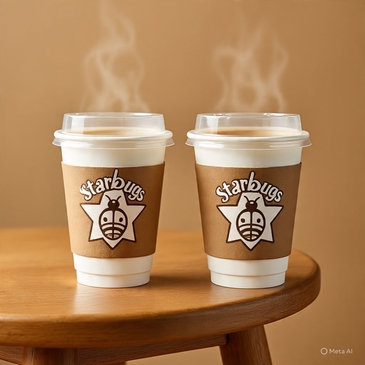
Josh went down to the Starbugs in the lobby and then, armed with what was surely no better than mediocre coffee, went to Coach's room. He knocked on the door and was quickly admitted.
"Okay," Coach said, "tell me what's on your mind that's so pressing you had to talk about at this hour."
"Well, Coach," Josh said, "I got these phone calls ... "
Josh went on the give Coach the full picture.
"You should have told me right after that first call," Coach said.
"I know, Coach," Josh replied, "but I didn't want to sound like a whiner or that I was making threats or anything because I didn't move up to AAA checkers this season."
Coach thought for a moment. "Okay," he said, "I get that, and I suppose what really counts is that you did finally tell me, especially after that second call. Well, let me lay it out for you, and though I shouldn't be letting you in on all of this, you do deserve something of an answer.

"First, that scout or recruiter or whatever he is, legit or not, is causing a lot of trouble. I'm going to have to notify management about this and there will be an international complaint filed--- well, at least if the guy can be tracked down through phone records or something. You'll be in the clear yourself, although you'll probably have to make a statement.
"Now, I'll tell you straight out that the Detroit organization won't sell out your contract at any price. So forget about that. You have a lot of long term potential and we're not letting you go anywhere. As to your moving up to AAA checkers, well, just keep playing the way you're playing and it won't be long. We wanted you to have some experience on first board this year before you go up. You know for sure that when you reach AAA play you're going to be a sub for while. That's a whole new class of play. So be happy on first board here in AA checkers for a little while longer. Your time will come. But there's more to this."
"I get it, Coach, I really do, and I sure appreciate the explanation. But what else is there?"

"It's kind of dirty pool. But this guy who called could be a complete phony, spoofing a phone number and misrepresenting himself in an effort to get you into trouble or even wreck your career. A couple of unscrupulous teams might see you as a formidable opponent and want you out of the game. It wouldn't be the first time, and your long-term potential makes you a possible target. Or maybe you made some enemies somewhere."
Josh immediately though about the executive at Ditzy World (see previous Checker Maven story). Would she do such a thing? She just might. But Josh thought it unlikely; Ditzy Company was more into lawsuits.
Coach continued, "So don't forget the old saying about when it seems too good to be true, watch out. I'm not saying that's the case here, but who knows, and in any case it's so far out of line it's not even funny. An unidentified team in an unidentified country? I guess I've heard it all now."

Marvin J. Mavin
"Yes," Josh said, "this did seem really odd. I mean, sure, I had a good first year but I know I need more experience. I'm not exactly a superstar at this point. You don't become Marvin J. Mavin overnight!"
Coach laughed. "That's for sure. And if one day you play like Marvin, that's terrific, but there are other attributes of his that you might not want to ... well, never mind. Go out there tonight and give 'em all you've got, okay?"
"You bet, Coach," Josh said, much relieved to have everything off his chest. "See you at practice."
Just at that moment Coach took a swig of his coffee and started to cough. "What is this stuff?" he asked. "This coffee is lousy!"
"It's from Starbugs," Josh said, and left the room as quickly as he could.
When Josh took his place at first board that night, Amy looked even more disturbed than on the previous night. "What's up, Amy?" Josh asked after their handshake, noting that her hand was shaky and sweaty.
"There was another phone call ... say, Josh, the series ends tonight and we'll have some freedom ... can we go for coffee after? I need to talk to someone about ... my troubles."

Josh's heart swelled. Was Amy asking him out, and asking him to be her confidant? "Sure," he said, hoping his voice had kept steady, "of course."
But once again, despite whatever nascent feelings Josh had for Amy, and all the other things on his mind, Josh wanted to win this one to show Coach that he understood his situation, accepted it, and was going to advance on merit, not through complaints and conspiracies. And merit meant playing to win in a professional manner.
The match began almost at once, and his game with Amy at last came down to the following position with Josh to play. The Eliminators were up by a score of 6-2 so it didn't matter whether Josh won, lost, or drew, but he wanted to score his third win and sweep the series.
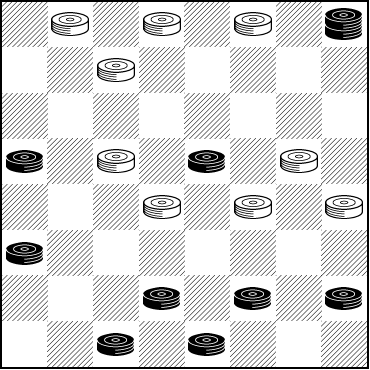
BLACK
Black to Play and Win
B:W13,14,15,17,19,27,30,31,32:B2,3,5,6,7,12,18,20,K29
He stole one more glance at Amy, but it didn't take long for Josh to confidently make his move.
Our man Gosh Josh sure has a lot going on in his young life right now, but as we've said, he's a professional and his job is to win for his team. Can you win this one? Hopefully for you the stakes aren't as high as they are for Josh, nor are you facing a raft of possible life-changing situations. Choose your move and then click on Read More for the solution and the rest of our story.![]()
Thanksgiving with Marvin and Priscilla

Greg Getten - CC0
"It's just perfect. We can take a mid-day flight to Miami, and get there in time to board the ship. We'll be at sea on Thursday and Friday, arrive in Panama Saturday morning, spend the day there and fly home directly from Panama to Detroit on Sunday. Well, by way of Newark, but that's just a detail. Like I said, it's perfect!"
Priscilla Snelson was talking to her husband, Marvin J. Mavin. about their plans, or more like her plans, for Thanksgiving weekend. They were in Priscilla's upscale 5,000 square foot condo, having an after-dinner conversation in the immense living room. The butler, before leaving for the evening, had lit a warm and cozy fire in the room's fireplace.
Priscilla was sipping a glass of dessert wine while Marvin, unsurprisingly, was drinking from a bottle of Belcher's Best Ale. Marvin, as we all know, was the superstar captain of the Detroit Doublejumpers in the National Checker League, while Priscilla was CEO of the huge conglomerate Rust Belt Holdings.
"My office closes at noon on Wednesday and doesn't reopen until Monday," Priscilla was continuing, "and your league also takes a Thanksgiving break. It's the perfect time to travel to Panama on a nice little four day cruise on the Luxury Line."
Marvin, who had been hesitating all along, continued to hesitate. "I don't know, Prissy," he said, "it sure seems like a lot of chasing around and stuff. And I don't know how you can use the words 'perfect' and "Newark' in the same sentence. That's in Jersey, right?"
"Could you please not call me Prissy?" Priscilla snapped. "And it's not chasing around as you call it. It's making the most of a long weekend when we both have off. How often do we get a chance to do that? And besides, we had no Thanksgiving plans. We're not going to my parent's place, or to your Mom's, and my friends all have other plans. And yes, Newark is in New Jersey last time I looked."
Marvin murmured about how it was kind of a good thing they weren't going to Priscilla's parents this year. He had an on and off relationship with them. He also would be glad to avoid Priscilla's rarified circle of very wealthy friends. On the other hand he would have liked to visit with Mom, but this year she would helping to prepare and serve Thanksgiving meals at the Senior Center in her town.
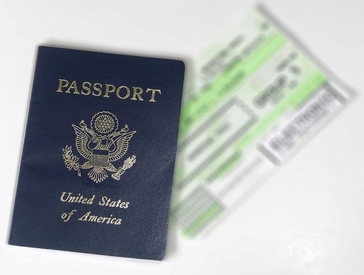
Pixabay - CC0
But Priscilla was continuing to speak. "In any event, dear husband of mine, there's no use arguing. For one thing, I've already booked all the tickets. And for another, I've arranged for you to be in charge of the checker activities on board the ship."
"What?" Marvin exclaimed. "If you already booked tickets, why ask me if I want to go? Do I, like, have a choice and stuff?"
"No, actually, you don't, but I was just hoping you'd agree willingly without making a fuss. I suppose I should know better by now."
"And," Marvin said, "wassup about leading the checker activity? I was kinda lookin' forward to a coupla days off seein' as how my team got a big road trip right after the break."
"Oh, it'll be good practice for you. You know, the best way to learn is to teach and all that. Anyhow having a big name checker star like you lead the activity got us a big discount. Well, in a way. We get the premiere suite and a dinner place at the Captain's table for no extra charge."
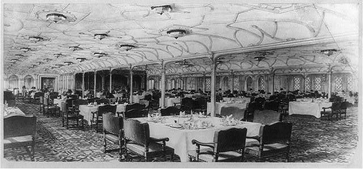
Public Domain
Now, Priscilla, with her hundred million a year compensation (more in good years), could probably afford any upgrades she wished. Marvin knew it was the prestigious seat at the Captain's table that she had wanted, although he didn't think it should have been at his expense. But Priscilla was Priscilla, and as a major businesswoman, status was important to her.
Marvin, knowing he had better go along with the program, merely muttered, "Bet they ain't even got no decent beer. Probably just fancy wine and cute cocktails and stuff."
"Oh, Marvin," Priscilla said, "they'll have the best of everything." Do you think I'd go on a cruise that was at something less than the top of the first class list?"
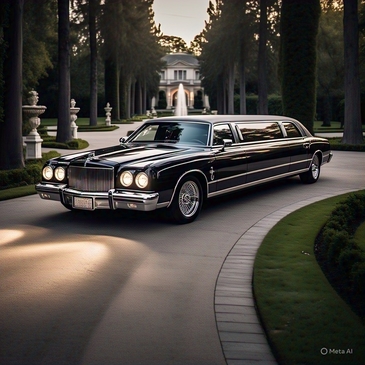
So on Wednesday afternoon the couple flew from Detroit to Miami--- first class, of course--- and took the waiting hired limo to the docks where they immediately boarded their ship, the Luxury Line's premiere cruise vessel, the Norwegian flagged Luxe de Luxe. No sooner were Marvin and Priscilla settled in their suite (no mere cabin for Priscilla), the ship sailed. They would cruise for two days and three nights, and on the first day the shipboard activities would begin, followed by a special at-sea Thanksgiving dinner.
Marvin decided it would be nice to have a beer before bed; it was almost midnight but of course the ship had several 24 hour lounges. That's when the difficulties began. Priscilla, preferring herbal tea in their suite, stayed behind. Marvin easily found one of the lounges, and needless to say it was very upscale and not at all like the dive bars he preferred back in Detroit.
Marvin took a luxurious seat at the elegant bar. He asked the formally dressed bartender for a bottle of Belcher's Best. The bartender sneered. "Sir," he said, "we do not serve plebian beverages here. This is a top-flight liner and we will not lower our standards for the occasional, ahem, sub-standard customer. May I recommend a craft beer? Luxury Lines commissions the world's top breweries ... "
"Just gimme a beer, whatever beer you got," Marvin interrupted.
"Shall I charge that to your room?" the bartender asked. "It's thirty US dollars, unless you prefer to pay in another currency. We accept Euros, Swiss Francs ... "
"Thirty bucks? Forget it," Marvin said and, somewhat in a huff, left the lounge and went back to his suite.
"Back already, honey?" Priscilla asked. She was in her silk PJs and finishing her herbal tea.
"I ain't payin' no thirty bucks for a beer and they ain't even got Belchers. I thought you said they had everything on this ship?"
"They have everything good," Priscilla said, and then added, "and of course good things do come at a price."

The next morning, the phone in Priscilla's suite rang. "It's for you, Marvin," she said, extending her arm and pointing the phone in his direction."
"Huh?" Marvin replied. He was barely awake, sitting at a table in the bedroom, drinking coffee. "Who calls at 8 in the morning?"
"I didn't ask, dear," Priscilla replied. "Just take the call." Priscilla tried to hide a little smile but Marvin noticed.
Wearing a quizzical look, Marvin got up and took the phone. "Hullo?"
"Mr. Mavin?" a voice said.
"Yeah? Who's this? And ain't it kinda early?"
"Rise and shine, Mr. Maven!" The voice was very cheerful. "This is the ship's activity director, reminding you that you're due in Salon Twelve on Aft Deck Five at nine o'clock for your first lesson."
"Lesson? I ain't takin' no lessons ... "
"No, Mr. Mavin, the checker lesson that you are going to give. Please arrive thirty minutes early for your instructions. That will give you, oh, about fifteen minutes. Don't be late! Ta ta!"
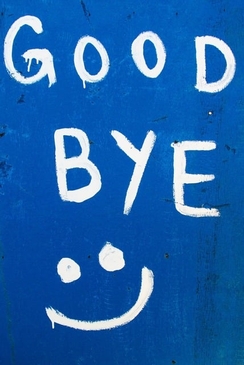
Picryl CC0
The call disconnected. Marvin hung up the phone and turned to Priscilla. "You knew about this, dincha?" he said.
"Oh, yes, well, you know, superstars are in demand and you have a rather ... full schedule. But only three hours in the morning and three more in the afternoon. A lot of people want lessons from you so the Activity Director thought it best to book a series of one hour lessons. But don't worry, you'll have time for lunch and after 4 PM ... you're free! Isn't that grand?"
Marvin was, shall we say, less than happy. But he didn't want to act dishonorably, nor did he want to disappoint his fans. So he hurriedly drank the rest of his coffee, swallowed a couple of bites of a buttered roll, dressed quickly and went off to find Salon Twelve on Aft Deck Five.
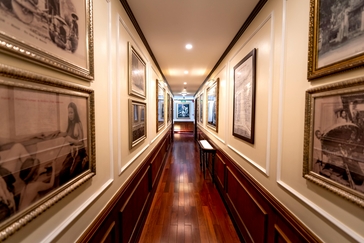
Quang Nguyen Vinh CC0
Marvin had to ask his way a couple of times; the ship was enormous and replete with stairs and passages leading everywhere in a bewildering manner. It took a good twenty minutes to reach the venue.
The room was richly appointed with polished wooden walls, a gleaming tiled deck, and mahogany tables fitted out with elegant checkerboards and checkers. Marvin was immediately greeted by an enthusiastic young man in a formal ship's uniform. The man was slim, blonde, and athletic and had something of a commanding presence.
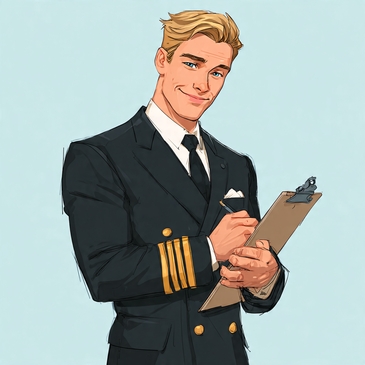
"Mr. Mavin!" he said, in a tone somewhat overly cheerful for eight forty five in the morning. "So glad you could make it! I'm Mr. Randolph R. Richardson, the Activity Director aboard ship. So nice to have you here, although I'll ask you to please come 15 minutes earlier tomorrow, yes? Agreed? Fine, very fine. Now," he continued, handing Marvin a manila folder, "here is your list of clients. As you know today will be individual lessons and tomorrow you will direct the Cruise Championship Tournament, a prestigious event with the first prize being a picture postcard signed by the Captain himself!"
"Uh sure, like uh ... "
"I'm so glad you understand. Now, I'm a busy person--- lots of activities for the guests, you know, and I must run off and see to the tennis lessons and the swimming contests and the champagne testing and oh, so many things! But should you need anything, just use the ship telephone and call one of my staff, who will be more than happy to assist you. Good day now!"
With that, Randolph R. Richardson was off and running, leaving Marvin alone in the Salon, holding the aforesaid manila folder with the list of clients.

And it wasn't long until the first client arrived. He was a middle aged man named Fred who came from Arkansas. He was a big fan of Marvin's and asked questions about professional checkers all throughout the next hour. Marvin was annoyed at first but then decided, it was Fred's money and he could ask whatever questions he wished. (Marvin had taken a very fast glance inside the manila folder and found that the cruise line was charging $500 for the one hour lessons.)
Marvin's next client was a grade school lad with a lot of talent, and the final client before lunch was a 30-something woman who wanted to flirt with Marvin more than she wanted to learn about checkers.
Marvin had a quick lunch and so the day continued. At the end of the afternoon, finding his way back to his suite was a little easier than things were in the morning, and he arrived in time to change for dinner and go to the main dining hall with Priscilla, to take a seat with her at the Captain's table.
It was just as Marvin had feared. While the Captain was of course impeccably dressed and the height of charm and politeness, some of the others at the table were somewhat less so.

"I hear you play checkers or something," said the man next to him at the table during the course of the dinner. He was likely in his fifties and wore an expensive suit and an even more expensive watch. "Now me, I play checkers too, and I'm really good at it, but what I really am is a hedge fund manager and ... "
On and on it went with everyone at the table trying to one-up each other. The dinner finally ended with traditional pumpkin pie, and Marvin could barely wait to get out of there.
"Having fun, dear?" Priscilla asked when they were back in their cabin. "Wasn't that a nice dinner with interesting people?"
Marvin just groaned, went into the suite's bedroom and threw himself on the bed.

Public Domain
The next day was the second and last full day at sea, and it was the day that Marvin would direct the checker tournament. Then, he would play the winner, with a big prize at stake if Marvin could be beaten or even drawn against.
Registration was bright and early at 8:30 with the tournament starting at 9. There would be two games per round, one with each color, and as many Swiss system rounds as needed to declare a winner. Fourteen players registered by a few minutes to 9. And that's when Marvin got an unpleasant surprise.
At one minute before 9, who came in but ... Dmitri Tovarischky.
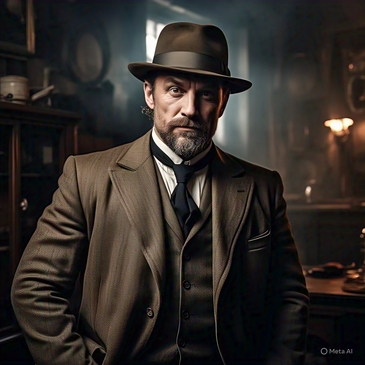
Now, long-time Checker Maven readers will remember Dmitri as Marvin's evil nemesis. They've had various unfriendly encounters over the years, the most recent being at a charity gala.
Marvin, after recovering from his surprise, managed to stammer, "You ain't playin', my Commie pal. Strictly amateurs."
Dmitri smiled menacingly. "That is where you make mistake, maya droogh. I am no longer professional. I am quietly retired amateur. I can play in tournament. I will play in tournament."
"Yeah, I heard, you got kicked out of pro play for running some kinda racket on the side. You can leave now. You ain't welcome and that's that."
Now, the ship's Activity Director, whom we met earlier, was listening in, and approached the registration table. "What's this?" he said. "A player not welcome? Mr. Mavin, on this ship all are welcome."
"But this here Pinko is a pro and ... "
"Tut, tut, Mr. Mavin, we must treat our customers politely and ensure their full satisfaction. If Mr. ... uh ... well, I can't quite pronounce it but sir," he said, turning to Dmitri, "you may certainly play. Now hurry hurry! The game must go on! Or something like that."
Marvin had no option. Dmitri was in the tournament.
With a total of fifteen players the tournament would last four rounds, two in the morning and two in the afternoon. By about 3 PM everything had wrapped up and it wasn't surprising that Dmitri had won every single game and took first place easily.
The Activities Director returned to announce the terms of the challenge game. Dmitri would play one game against Marvin. If Dimitri won, he got the grand prize of two free drinks at the First Class bar, a $60 value. If he drew, he got the consolation prize of one free drink at the First Class bar, a $30 value. If he lost, he got a handshake from the Activities Director but nothing more. Since the tournament entry fee was $100, it seemed that the real winner was the cruise line.
Dmitri was cackling as he sat down across from Marvin. "I will be having free drink with girlfriend tonight," he said. "Checkers Boy was lucky before but no more luck for him."
Marvin looked up. "You got a girlfriend? Another Commie that don't know no better?"

'You are making insult to upset concentration? Will not succeed. Yes, I have beautiful Russian girlfriend. She is coming from Minsk. On this cruise we are having special time together. Maybe I introduce you to my Natasha one day." Dmitri laughed again. "Or maybe not. She would not like you. She does not like the American man. Or even American woman."
"Then she can go back to ... "
"Time to play, gentlemen!" the Activities Director interrupted. "The match is being broadcast on the ship's closed circuit television and there are many viewers so don't keep them waiting!"
The game began. After some back and forth, the following position arose with Dmitri to play.
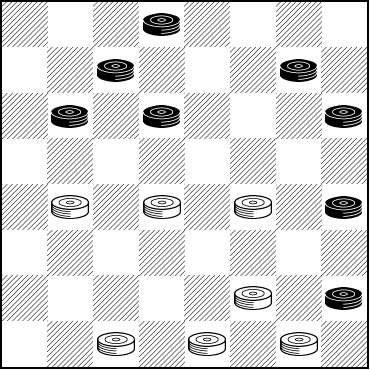
WHITE
White to Play, What Result?
W:W17,18,19,27,30,31,32:B2,6,8,9,10,12,20,28
"Watch this, Checkers Boy," Dmitri said. "You think being piece up is big deal. But Dmitri show you."
So saying, Dmitri played 18-15, resulting in the following position with Marvin to play.
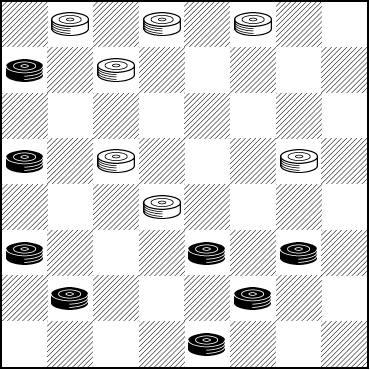
BLACK
Black to Play and Win
B:W15,17,19,27,30,31,32:B2,6,8,9,10,12,20,28
Checkers Boy will lose this game
And must hang his head in shame.
Dmitri is our one true hero
And Checkers Boy is just a zero.
Dmitri repeated this several times. Marvin, now fuming, remarked, "You think being a Commie is cool, but it ain't. And your last move wasn't cool either. Ha ha. Watch this!
Marvin made his move.
What should Dmitri have played in the first diagrammed position? What did Marvin play after Dmitri's 18-15?
We don't exactly know if you're on a deluxe cruise to Panama over this Thanksgiving weekend, or if you're locked in competition with an arch-rival. But we do hope you'll have time to try today's two-part problem. To see the solutions and the conclusion of our story, click on Read More.![]()
Sal's Thanksgiving Plans

Sylvia Westerman
"Sal, I really think you ought to agree with me."
Those words were spoken by Sylvia Westerman, Sal Westerman's wife of many decades.
It was mid-November of 1955 and the Westermans were in their modest home on North 13th Street in Bismarck, North Dakota. It was a Saturday and the Westermans were having a soup and sandwich lunch at just about noon; Sal would soon be off to the weekly meeting of his Coffee and Cake Checker Club and Sylvia would be joining her knitting group at the home of a neighbor.
The Westermans had been discussing Thanksgiving plans, and with the holiday less than a week away, they still hadn't decided what to do. Or, at least, Sal hadn't decided. Sylvia most certainly had.

Joyce
"Joyce can't come this year," Sal said, "so can't it just be the two of us at home?" Joyce was their daughter, who was a lawyer and had moved to Washington D.C. to work for a very prestigious Washington law firm.
"Joyce can't come most years," Sylvia pointed out, "and we've had a quiet Thanksgiving a lot of times. This year most of our friends are out of town or have other plans, so ... "
"I hear the restaurant at the Patterson Hotel puts on a great Thanksgiving dinner," Sal quickly said.
"I'm sure they do," Sylvia replied, "but that's not the same as a home cooked meal and besides it would be frightfully expensive. No, Sal, the Patterson is out, and we're going to Dickinson. It's decided. We had this same debate a couple of years ago and we're not having it again."

Phoebe
Sal tried not to groan audibly. Dickinson, a town about 90 miles west of Bismarck, was where Sylvia's sister Phoebe lived, and Sal and Phoebe did not get along--- to say the least. Sal tried his best for his wife's sake, but Phoebe offended Sal in the worst possible manner--- he thought Sal's checker hobby was a waste of time, and didn't hesitate to tell him so, often saying that Sal was lazy and spent time on checkers rather than help around the house "like a decent husband ought to do." Phoebe herself had been single all her life but had definite opinions about husbands, even never having had one.
"How about you go, and I'll take the train down to Minneapolis. They're having their annual Thanksgiving weekend tournament. That way we'll both be happy," Sal said. "And yes, we had this debate two or three years ago, and I went to Dickinson that time. So how's about I catch a break this time?"
But Sylvia's reply confirmed that it was hopeless."

"You and I are going to Dickinson, and that's my last word on the subject. We'll go down there on Wednesday afternoon, and we can come home on Sunday morning. Surely you can deal with four nights in Dickinson. And it doesn't matter that you went along a few years ago. That was then and this is now."
Sal wanted to say that it wasn't Dickinson that he had any trouble with, it was Phoebe. But Sylvia knew as much and, once in a while, expected him to grin and bear it.
There weren't too many more words exchanged between the couple. Sal sort of grunted, which Sylvia took as assent. Sylvia seemed to be about to say more, which Sal knew would be admonishments on being nice to Phoebe and so on, but he stood up and quickly said, "Time to go to the club, dear." And after that, he had his jacket, gloves, and hat on and was out the door in record time.
The 10 minute or so walk to the Beacon Cafe, where his club met every Saturday afternoon between Labor Day and Memorial Day (except for major holidays, like Thanksgiving weekend). The weather was slightly damp and overcast and it was cool rather than cold, at about 25F, which Bismarck residents considered relatively mild for November.
Walking calmed Sal down a little, but still, his stress must have been visible, for when he entered the Cafe--- an uncharacteristic five minutes late--- the proprietress, Deana, took one look at him and said, "Having a hard day, Sal?"
Most of the other club members had already arrived. The "boys" as Sal called them were all but one of them at least fifty years of age. Today Larry, Wayne, Dan, Delmer, Young Blaine, Ron, and seldom seen Theo were present. All of them were looking in Sal's direction, wondering what he would say.
"Oh, it's nothing," Sal said as he made his way to the back of the Cafe where the big booths were located. "Nothing at all. Well, nothing much. Ah, okay, a little something but I wouldn't worry about it."

Young Blaine
It was clear that all of the boys, not to mention Deana, were curious. But no one pressed Sal, at least not at first. Everyone talked about what they were doing for the holiday. Wayne would be going to the farm out in Wilton for a big family gathering. Dan had relatives in the western part of the state and would be visiting there. Ron and Larry were having small family dinners. Young Blaine and his new wife, Young Moira, would be going up to Minot. Even Deana chimed in, saying she was closing the Cafe for the weekend and going out east to the family farm in Gackle.
Finally, it was Deana who brought it up. "Well, your turn, Sal," she said, "we all know something's bothering you and it's not hard to guess it's about Thanksgiving."
"Checkers first," Sal said. "I've got a nice problem for you boys ... "
"Come on, Sal," Young Blaine interrupted, "we're all friends here. Tell us what's going on."
Sal, in the middle of setting up his checker problem, stopped. "All right then," he said, "it's about Sylvia insisting on going to Dickinson for Thanksgiving with Phoebe. Again."
Now, everyone knew about Phoebe, and Sal's trials and tribulations in that department. They all were sympathetic but they did stop short of outright disagreeing with Sylvia, even outside of her presence. Again, though, it was Deana who spoke up.

Deana
"You know, Sal," she began, "as much as I want you to be happy, Sylvia's got a point. She ought to be able to spend a holiday with her sister once in a while. I seem to remember this same thing from a Thanksgiving in the past. You should know by now that Sylvia will get her way."
"But do I have to spend it with Phoebe?" Sal asked. "Phoebe could care less if I were there ... oh ... right ... she'd have a lot to say if I don't show up, wouldn't she, and it would make Sylvia uncomfortable." Sal thought a moment longer. "Of course," he continued, "she'll have a lot to say if I do show up!"
Everyone laughed, but Deana said, "I'm sure you're right Sal, but you know what the right thing to do is, too."

That pretty much wrapped up the discussion, and Sal finished setting up his problem. Deana announced that the pumpkin muffins were hot and fresh, and Sal said he was looking forward to the boys buying some for him and his wife, as was the tradition if the boys couldn't solve Sal's problem. Sal, in turn, would buy if the boys did solve it.
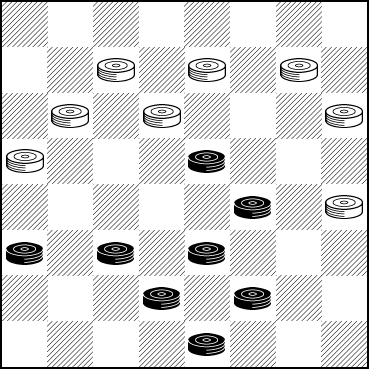
BLACK
Black to Play and Win
B:W13,20,21,23,24,25,26,27:B2,6,7,10,11,12,14,18
Sal said that 45 minutes ought to be enough time but the boys, already deep in study, likely didn't hear him.
If you live in the US, what are your Thanksgiving plans? We hope they are pleasant ones and don't involve difficult relatives or stressful situations. But regardless, for the moment see if you can solve Sal's problem. Click on Read More when you're ready to see the solution and the brief conclusion to our story.![]()
Josh's Dilemma --- Part One

"Gosh Josh" Gordon
The season had opened and "Gosh Josh" Gordon was still with the Erie Eliminators, a AA club which was part of the Detroit Doublejumpers farm system. Josh had moved up to first board from third board, a rather stunning achievement for a player with just a year of professional experience. But there were rumors that Josh was going to be moved directly to the Toledo Tillicoultrys, a big step up to AAA play.
However, that didn't happen, and needless to say Josh was disappointed. However just a few weeks into the new season, a couple of things came up, and Josh found himself facing a dilemma..

The first thing that came up was this. Josh was in his little apartment in a middle-class section of Erie one evening on an off-day for the Eliminators. (AA salaries were good but not extravagant, even for up-and-comers, and Josh lived comfortably but modestly.) The next morning the team would be taking the bus for a five hour ride to Harrisburg, where the Eliminators had a three match series with the Harrisburg Huffers.

Public Domain
Then his cell phone rang. Nothing unusual about that, but he didn't recognize the number, which identified as being from Jersey City, New Jersey. Josh thought it might be a spam call, but he answered anyway.
"I would like to speak to Mr. Gosh Gordon," the voice on the other end of the line said. It was male and had a strong accent.
"This is Josh Gordon," Josh replied. "Who is calling, please?"
"Let me introduce myself," the voice said. "I am Mr. Mack, and I represent a very important checker team that plays in another country. It is actually a small kingdom in a faraway land, which has much money. That is both the team and the land are having much money."
"Sure," Josh said, "and I'm the Easter Bunny. Good bye!"

"No, you must wait!" the voice said with clear urgency. "I am telling the truth! You would know the name of the kingdom, it is very famous, it is the kingdom of a very famous king but I may not yet say to you the name, however you will know it later after we make the agreement between us."
"Agreement? What are you talking about? Look here, pal, you have maybe thirty seconds to tell me who you are and what this is all about. And how did you get my phone number anyhow?"
"That also I cannot tell you, but you will know by this finding of your phone number that my kingdom is very serious."
"About what? You have fifteen seconds left."
"About making you the offer, Mr. Gosh."
"The name is Josh. What offer?"
"To come and play the checkers for our team in my kingdom. We are wanting young American players to make us even stronger. We are asking only the young players who will play many years for us and be paid very much money. We know that you, Mr. Gosh, are a good player and very soon we will make the offer to you. You will like it, the offer."

"Sorry, dude," Josh said, "First, I don't know who you are, or whether you're legit or more likely some kind of nut case. Second, I have a contract with the Doublejumper organization right here in the USA. I can't play for whatever or wherever your team is even if I wanted to, which I don't think I do. If there even is such a team. Bye now."
Once again Josh heard "A minute, Mr. Gosh!" and the voice continued to speak.
"Never mind of the contract!" the man said. "We will for you break it. We will pay the owners of your team. They will not mind."
"They will mind," Josh said, "probably a lot."
"It does not matter! They cannot reach you in our kingdom. You will be safe and you will live as a rich person with an apartment and all of your wishes will be answered! If your team makes the lawsuit, in our kingdom it will not have meaning! Now, I will at your next games be watching. You will not know me. But if you play very well, we will make the big offer. How do you answer, Mr. Gosh?"
"I say you're wacko," Josh said, and cut off the call. "So crazy," he muttered.

Public Domain
Now, it was near Josh's bedtime and he thought he would just blow it all off. But that's when he got to thinking. Could this actually be a foreign recruiter? It didn't seem likely, but Josh had heard of some players taking offers overseas in odd locations. Josh thought maybe he ought to report the call to his Coach, although he wasn't sure if it was even worth a second thought.
But the more Josh thought about it, the more he didn't know what was best. If he didn't tell Coach, Josh himself might be out of line, and that's not a position he cared to be in; and though unlikely, if word got out somehow, Coach might even think Josh was considering jumping ship. However if he did tell Coach, would it look like he was saying that you should have sent me up to AAA and if you don't here's what might happen? And would Coach likely think Josh had only made up an incredible and crazy story?
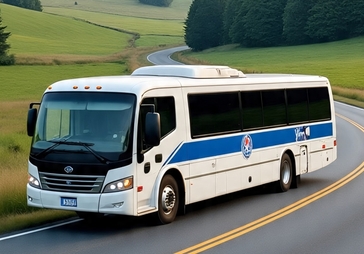
Josh had kind of a restless night, and by morning he still couldn't get the matter off his mind, but then it was time to board the team bus for the ride from Erie to Harrisburg. Josh didn't want to try to talk to Coach in front of everyone else. That was a likely just a convenient excuse for putting things off and Josh knew it. But the first match of the three match series was tonight and there was in any event little free time.
Game time rolled around and Josh still hadn't talked with Coach. But as he took the field, the second thing happened and at least for the moment, it made Josh forget all about his problems. For, waiting at first board, to be Josh's Harrisburg opponent, was the loveliest young lady Josh had ever seen. Her name was Amy Rye Zwieback and she was another up and coming young player, about the same age as Josh.

Amy Rye Zwieback
Now, was this young woman truly the loveliest in the world? It's certainly hard to say, but in Josh's mind, she was. It might have been that Josh was just especially susceptible at the moment, or maybe there was some other reason, but he was thunderstruck, and the sight of this young lady took his breath away.
Perhaps Josh always had some sort of ideal in his mind; perhaps too he was something of a romantic. All he knew for sure was that he had this tremendous reaction. In the back of his mind, though, Josh knew that he was being a bit foolish and had better settle down. After all, he was there to win, not to woo.
But darn it all ... what an image of perfection! And when she shook hands and gave Josh a warm smile, and then wished him good luck in a honey-laden contralto voice, Josh's heart leapt.
But Josh was a professional checkerist, and he tried to play his best game despite being more than a little distracted. He managed quite well, even if he kept stealing little glances at Amy, and after some time the position on the board was as follows, with Josh to move.
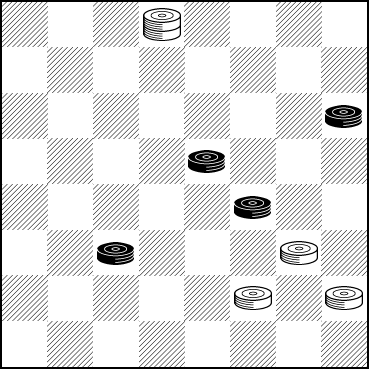
WHITE
White to Play and Win
W:WK2,24,27,28:B12,15,19,22
As we said, Josh was there to win, and he thought he saw a way to do it. But what would Amy think if Josh won the game? Would she be very disappointed and therefore unhappy with Josh? Or would she admire him for his over the board skills?
All Josh knew was that he had to focus and play the best move, come what may.
What would you do in this situation? It seems that in the course of just a couple of days, our hero Josh has encountered both a sticky career situation and something of an instant romantic infatuation.
Choose wisely, and then click on Read More for the solution to the problem and the rest of Part One of our story.![]()
Politically Correct: Conclusion

Marvin J Mavin
In our previous story, our hero, Marvin J. Mavin, refused to fill out a 'political correctness' evaluation sent to him by Grosse Pointe Modern Thinkers Academy, in advance of his scheduled lecture at that school.
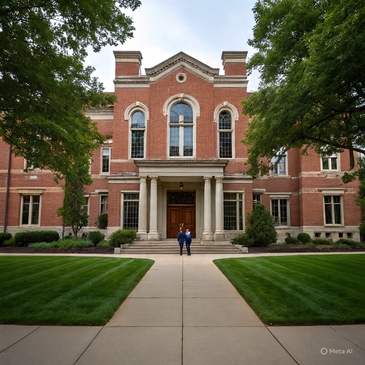
Grosse Pointe Modern Thinkers Academy
Not having received the evaluation form in a timely manner, the school canceled Marvin's lecture, and sent a complaint to the Belpre, Ohio headquarters of the National Checker League, which read in part:
We are highly upset by Mr. Mavin's refusal to complete a routine political correctness evaluation, which we require in order to protect our students from mini-micro aggressions, ideas which they may find offensive or not properly aligned with beliefs and holdings required of the politically correct, and so on. We had no option but to deny Mr. Mavin access to our school. Because of this, our students were deprived of the opportunity to further develop their interest and skills in the sport of checkers.
We would like to further point out that, upon review of Mr. Mavin's National Checker League web page, we noted that he did not list his preferred pronouns, in an obvious gesture of contempt toward an obligation incumbent upon all politically correct members of society.
Finally, while not related directly to Mr. Mavin, we want to point out that our checkers are blue and gold in color, in order to avoid any untoward implications by forcing students to play with red and white or black and white checkers, which could lead to a belief that one of these colors is more likely to win than another, and is thereby thought to be superior.
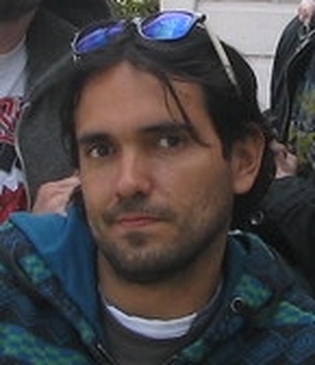
NCL Commissioner Homeboy
The letter was addressed to Mr. Axel Homeboy, the NCL Commissioner, who immediately contacted both the Detroit Doublejumpers (Marvin's team) owner, who in turn contacted the Head Coach, Mr. Baba Dudut, who then berated Marvin in front of the team at the next practice, not because Coach thought that checkers ought to be politically correct, but because Coach had gotten in hot water with the team owner and the Commissioner.
Marvin just listened in silence, as did his teammates. However, there was a match that evening with the Arizona Almas, and unfortunately, both Marvin and the team were dispirited and discouraged by Coach's rantings, so the match wasn't going well. The fourth and fifth board Doublejumper players had drawn. The third board was won by the Doublejumpers but the second board fell to the Almas. That left Marvin on first board, needing a win or his team would lose the match on tie-break rules.

Paul "Peanuts" Peterson
Marvin's opponent was Paul "Peanuts" Peterson, who was a reputable player. Peanuts was playing a good game and the situation came down to the following position with Marvin to play, needing a win.

WHITE
White to Play and Win
W:WK22,23,30:B26,27,K31
Marvin gave it some thought but couldn't quite get the whole political correctness debacle out of his mind. Finally, though, he made his move.
A win for the team is at stake. Set ideologies aside; the game is what matters at the moment. Can you win it? Give it a try and then give a correct click of the mouse on Read More to see the solution and the rest of the story.![]()
Beacon Cafe: Fall Has Come

In previous stories about the Beacon Cafe, with its setting in 1955 Bismarck, North Dakota, we've explained about both the spring and fall seasons and the absolute requirement to rake your yard. In the spring, that's done on the first weekend of April, no matter if snow is still on the ground. In the fall, the rule is a little less rigid, but it's usually the first weekend in October, after this cold-weather city has typically experienced its first hard frost.
There was no question about it. If you were a homeowner, you followed these rules if you didn't want to be known as a misfit, someone who didn't belong, or even something of a pariah, because if your lawn didn't look right, it affected the rest of the neighborhood.
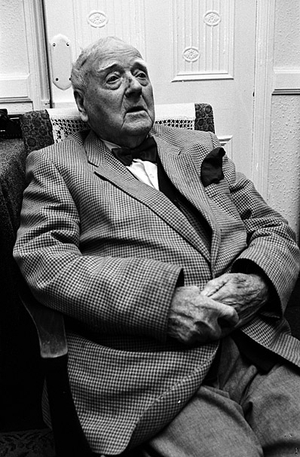
Sal Westerman
Sal Westerman, whom we all know as the unofficial leader of the Coffee and Cake Checker Club, which met every Saturday afternoon at the Beacon Cafe with the exception of summer and holiday breaks, was a long-time Bismarck resident and understood how the town worked. When he was younger, he and his wife Sylvia, later joined by their daughter Joyce, were out there raking faithfully every spring and fall. But some years ago Joyce had moved away to Washington D.C. to join a law practice, and Sal and Sylvia were now elderly, so they hired out their yard raking to some ambitious and relatively younger ladies in the neighborhood.
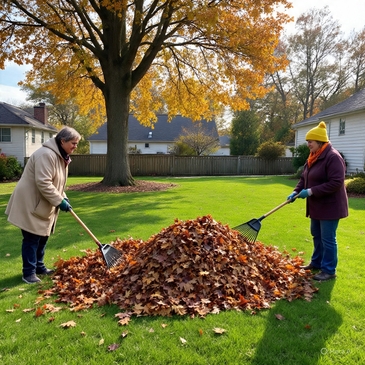
Hiring someone to do your raking was acceptable, if marginally so. Doing it yourself was considered much more meritorious, but if you had an excuse, such as age or infirmity, people would nod their heads and understand, even if they felt it wasn't quite the same as getting out there and sweating. Of course, if you were younger (such as under 70) and capable (such as not terminally ill), hiring out the yardwork was considered the height of laziness. And not doing it at all--- maybe you need to move to a slum in a big city where you'd fit in better.

But "raking day" had taken place on the previous Saturday, which had turned out to be a slow day for the Coffee and Cake Checker Club, as many of the "boys" couldn't get their raking done before the 1 PM club start time. Now, the "boys" were, except for Young Blaine, all over 50 years of age, yet everyone other than Sal and Old Frank did their own yardwork.
Today, though, the attendance was much better. Dan, Delmer, Wayne, Larry, Louie the Flash and Young Blaine were all there in addition to Sal. Naturally the initial talk was about raking leaves the previous weekend.
Now, back in the day, leaves were raked and left on the curb for City pickup, though some rakers would create mulch piles and a few would haul the leaves to the landfill on their own. But another measure of merit was how big a leaf pile you created. Larger leaf piles were of course more highly esteemed than smaller ones.

Blaine said he and his newlywed wife Moira didn't have to rake as they weren't yet homeowners and were renting in an apartment building. However the building's owner offered Blaine a day's worth of pay to rake up the grounds, and Blaine and Moira gladly took it on. He mentioned the huge pile of leaves that he had loaded into the owner's pick-up truck to haul to the landfill. But the rest of the boys insisted that it didn't count because an apartment complex was larger than a house and besides, Blaine did it for hire.

Moira
Louie the Flash hemmed and hawed about his own efforts, mumbling about going to Fargo to visit yet another new girlfriend. "I raked her yard, does that count?" he asked. But the boys said they could hardly give any credit to out of town raking.
The raking one-upmanship contest went on for a little while longer when finally Sal intervened. "Boys, we're here for checkers! Now I'm sure you all--- or almost all--- did your jobs, and who had the biggest pile of leaves really isn't all that important. Let's just call it a draw and move on."
There was a tiny bit of grumbling, especially from Wayne, who had a big house and a big yard and thought he ought to have been the winner. But eventually there were nods of assent.
"Now, look," Sal said, "I have a problem for you that is quite thematic, and if you think raking leaves and the game of checkers aren't related, take a look at this.
Sal laid out the following position on a couple of the checkerboards which were on the tables in the big booths at the back of the Cafe.
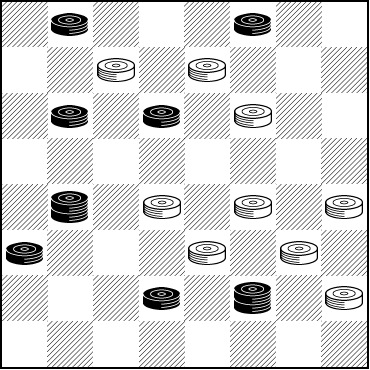
WHITE
White to Play and Win
W:W6,7,11,18,19,20,23,24,28:B1,3,9,10,K17,21,26,K27
"Well then, here's the idea. There are a lot of pieces on the board. Think of them as leaves and find a way to rake them all up! I'll give you, oh, forty-five minutes to solve it."
The proprietress of the Beacon Cafe, Deana, always knew when to speak up. A blue-ribbon baker, Deana sold the boys wonderful baked treats during their meetings. If the boys didn't solve Sal's problem, they would buy for Sal with some to take home for his wife; but if they solved it, Sal would buy for the group.

"I've got autumn leaf cookies today," Deana called out. "Freshly baked and from an old family recipe." As usual, Deana's timing--- and marketing--- were impeccable.
Are there any special rules about raking your yard, whether in spring or fall, in your community? Do you follow those rules or would you rather just play checkers? We know what our option would be! Regardless of your local situation, do try to "rake the leaves" in Sal's problem. Click on Read More to see the solution and the brief conclusion of our story. We're sorry, but you'll have to provide your own cookies.![]()
The Checker Maven is produced at editorial offices in Honolulu, Hawai`i, as a completely non-commercial public service from which no income is obtained or sought. Original material is Copyright © 2004-2026 Avi Gobbler Publishing. Other material is public domain, AI generated, as attributed, or licensed under CC1, CC2, CC3 or CC4. Information presented on this site is offered as-is, at no cost, and bears no express or implied warranty as to accuracy or usability. You agree that you use such information entirely at your own risk. No liabilities of any kind under any legal theory whatsoever are accepted. The Checker Maven is dedicated to the memory of Mr. Bob Newell, Sr.


